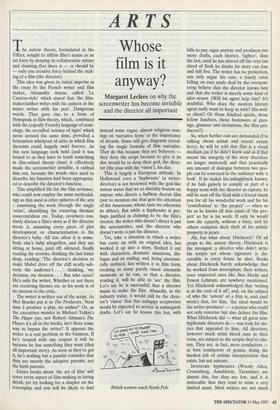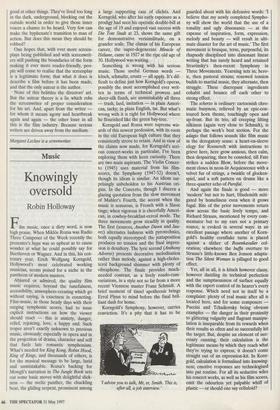ARTS
Whose film is it anyway?
Margaret Leclere on why the screenwriter has become invisible and the director all important
The auteur theory, formulated in the Fifties, sought to affirm film's status as an art form by denying its collaborative nature and claiming that there is — or should be — only one creative force behind the mak- ing of a film (the director).
This idea was given its initial impetus in the essay by the French writer and film maker, Alexandre Astruc, called 'Le Camera-stylo' which stated that 'the film- maker/author writes with his camera as the writer writes with his pen'. Dangerous words. They gave rise to a form of Newspeak in film theory, which, combined with the (equally French) language of semi- ology, the so-called 'science of signs' which arose around the same time, provided a bottomless whirlpool of idies in which film theorists could happily swirl forever. As this new language took hold (and it was bound to as they have to teach something in film-school theory class) it effectively made the screenwriter invisible, it rubbed him out, because the words once used to describe his function had been appropriat- ed to describe the director's function.
This simplified life for the film reviewer, who could now employ the same methodol- ogy as that used in other spheres of the arts – examining the work through the single `artist', identifying his recurring themes/ concerns/ideas etc. Today, reviewers rou- tinely discuss a film's story as if the director wrote it, assuming every piece of plot development or characterisation is the director's baby. All too often it is some- body else's baby altogether, and they are sitting at home, paid off, silenced, finally reading the reviews, drinking the last bitter drop, reading: 'The director's decision to make Mabel drive off the cliff neatly sub- verts the audience's . . . ', thinking, 'my decision, my decision . . .' But who cares? He's only the writer. Whether or not there are recurring themes etc. in his work is of no interest to the critic.
The writer is written out of the script. As Mel Brooks put it in The Producers, 'Next time I produce a play, no author!' Or, as the executives wonder in Michael Tolkin's The Player (no, not Robert Altman's The Player it's all in the book), isn't there some way to bypass the writer? It appears the writer is a real problem in the business. If he's treated with any respect it will be because he has something they want (that all important story). As soon as they've got it, he's nothing but a painful reminder that they are merely the adoptive parents, not the birth parents.
Entire books about 'the art of film' will cover every aspect of film-making in loving detail, yet try looking for a chapter on the screenplay and you will be likely to find instead some vague, almost religious mus- ings on 'narrative form' or the importance of dreams. Some will give diagrams reveal- ing the magic formula of film narrative. They do this because they are believers they deny the script because to give it its due would be to deny their god, the direc- tor (the man with the 'vision), his due.
This is largely a European attitude. In Hollywood even a 'hyphenate' (a writer- director) is not bestowed with the god-like auteur status that we so slavishly bestow on anyone who directs a halfway decent film (not to mention one that gets the attention of the Americans, whose taste we otherwise so abhor). But while a hyphenate is per- haps justified in claiming to be the film's creator, the writer who doesn't direct is just the screenwriter, and the director who doesn't write is just the director.
Yet, take a situation in which a writer has come up with an original idea, has worked it up into a story, fleshed it out with characters, dramatic situations, dia- logue and an ending; and, being cinemati- cally inclined, has written it in film form, creating as many purely visual cinematic moments as he can, so that a director, reading it, will be able to 'see' the film. Let's say he is successful; that a director wants to make the film. Absurdly, in the industry today, it would still be the direc- tor's 'vision' that this unhappy scriptwriter would be expected to service in subsequent drafts. Let's say he knows this but, with British women reach North Pole bills to pay, signs anyway and produces two more drafts, each shorter, 'tighter', than the last, until he has shaved off the very last shred of flesh he thinks his story can lose and still live. The writer has no protection, can only argue his case, a lonely voice falling on ears made deaf by the overpow- ering believe that the director knows best and that the writer is merely some kind of idiot savant. (Will his agent help him? It's doubtful. Who does the modern literary agent really want to keep in with? His writ- er client? Or those kindred spirits, those fellow lunchers, those bestowers of pres- tige, glamour and invitations, the film pro- ducers?) So, when further cuts are demanded (I'm talking about actual and recent events here), he will be told that film is a visual medium (as if he didn't know and as if that meant the integrity of the story therefore no longer mattered) and that practically any amount of dialogue between two peo- ple can be conveyed to the audience with 'a look'. If he makes his unhappiness known, if he fails gamely to comply as part of a happy team with the director as captain, he will be sent off the field with a forced thank you for all his wonderful work and for his `contribution' to 'the project' — when so far as he knows all that exists of 'the pro- ject' so far is his work. If only he would now die (quietly, without a fuss), and let others complete their theft of his artistic property in peace.
Ah, but what about Hitchcock? Of all props to the auteur theory, Hitchcock is the strongest: a director who didn't write his scripts yet whose signature is dis- cernible in every frame he shot. Books about Hitchcock barely acknowledge that he worked from screenplays; their writers, even respected ones like Ben Hecht and Ernest Lehman, are nowhere mentioned. Yet Hitchcock acknowledged that 'writing is at the root of it all', and, on the subject of who the `auteur' of a film is, said (and wrote) that, for him, 'the ideal would be the writer-producer' — a person who could not only conceive but also deliver the film. What Hitchcock did — what all great non- hyphenate directors do — was look for sto- ries that appealed to him. All directors, however much artist blood runs in their veins, are subject to the scripts they've cho- sen. They are, in fact, mere conductors at best conductors of genius, doing the hardest job of artistic interpretation that exists, but not auteurs.
Inveterate hyphenates (Woody Allen, Cronenberg, Amoldovar, Tarantino) are almost this, but they are few, and it is noticeable that they tend to mine a very limited seam. Most writers are not much good at other things. They've lived too long in the dark, underground, blocking out the outside world in order to give those inner voices a chance to be heard. Very few can make the hyphenate's transition to man of action. But does this mean they should be robbed?
One hopes that, with ever more screen- plays being published and with screenwrit- ers still pushing the boundaries of the form making it ever more reader-friendly, peo- ple will come to realise that the screenplay is a legitimate form; that what it does is describe a film before it has been made, and that the only auteur is the author.
None of this belittles the directors' art. But the auteur theory is a lie which robs the screenwriter of proper consideration for his art. And, apart from the writer for whom it means agony and heartbreak again and again — the other loser in all this is the film industry. Because serious writers are driven away from the medium.
Margaret Leclere is a screenwriter.



































































 Previous page
Previous page